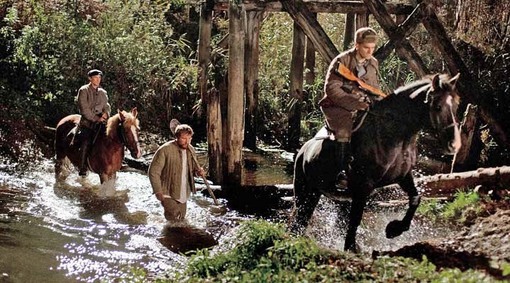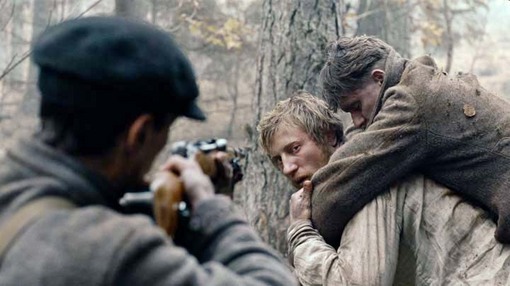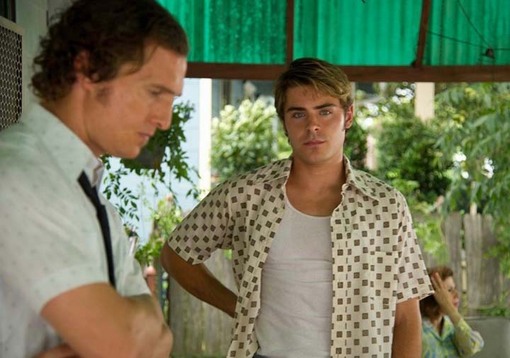Big stars were out to shine this morning in Cannes, when “The Paperboy” by Lee Daniels premiered in competition, with a cast that includes Matthew McConaughey, Zac Efron, Nicole Kidman, David Oyelowo, John Cusack, and Grammy Award-winning R&B singer Macy Gray. Daniels had a massive hit with his previous film “Precious,” which premiered here in 2009 and went on to earn six Oscar nominations with two wins, and countless other awards worldwide.

A director with that kind of success in his recent past has got to have a lot of hopes and fears riding on his next film. Daniels certainly had star power in his corner on “The Paperboy,” but the film got a mixed reaction this morning in the Palais, and I’m not sure it’s headed for a repeat of the acclaim that “Precious” experienced.
“The Paperboy” is adapted by Pete Dexter and Daniels from Dexter’s novel of the same title. The film reportedly takes a few deviations from the source novel (which I haven’t read) to result in pretty much a whole new story. There are many shifts of tone, making the film simultaneously a comedy, a mystery/thriller, and a Southern gothic potboiler. It’s amusing and frustrating; hilarious and tense; awkward in its construction yet featuring bursts of gripping acting.
Journalist Ward Jansen (McConaughey) of the Miami Times returns to his home town with his writing partner Yardley Acheman (Oyelowo) to investigate the alibi of Hillary Van Wetter (Cusack), a possibly innocent local lowlife now on death row for the machete murder of the town’s redneck sheriff. Ward reunites with his admiring younger brother Jack (Efron), who becomes a key player in the investigation, which hinges on cooperating with Charlotte Bless (Kidman), the bottle-blonde bimbo who has a jailhouse correspondence with Van Wetter and intends to marry him. The story has intermittent narration by Anita (Gray), the Jansen family’s black maid, who functions as somewhat of a big sister to motherless Jack.

Up to this point the film is played largely for laughs. There’s a very funny scene in which Ward, Yardley, Jack, and Charlotte visit Van Wetter in prison and a virtual sex act which can’t be described in a family-friendly way takes place between the convict and his would-be fiancee. The comedy is again all-out raunchy in a scene at the beach in which Jack, who has fallen in love with Charlotte, suffers a massive attack by jellyfish and his life can be saved only by having the stings neutralized with urine. She straddles his chest for the mission of mercy, and I began to wonder if Kidman’s crotch double gets a credit.
It’s not all laughs, and the story takes a different turn when the dark side of Ward’s sex life is revealed and Jack begins to realize that neither his brother nor his associate are exactly who they seem. Neither is Van Wetter. As Ward’s role in the plot begins to diminish and Jack’s comes to the forefront, McConaughey is still afforded some intense scenes, including a half-drunk soliloquy in the bathroom as Jack tries to coax him into the shower. McConaughey’s reputation as a macho hunk takes a backseat to his very effective characterization here as man deviled by his weaknesses and appetites.

There’s brutal sex to come, bloody violence, and a few loose ends. The principals in the cast are uniformly engaging with the exception of Oyelowo, who isn’t given a lot to work with, and whose character is largely a prop. The cast doesn’t much gel as an ensemble, and Daniels makes some questionable visual choices, sometimes resorting to a split screen or other digital effects that give the film a cheesy look. The ending, which is narrated rather than being resolved, comes off as a cop-out.
Almost every hour at Cannes involves choices, and sometimes you make good ones, sometimes bad. No matter what you choose, there’s always the sneaking feeling that something better is going on somewhere else. In the minutes following the conclusion of “The Paperboy,” hundreds of journalists headed for the press conference room, although only a lucky couple hundred with the highest-ranking passes would be admitted. This was the biggest clog of clamoring press I’d seen for any post-film event this year.

With only a couple days left to see new films, my initial choice was to go to the premiere of the Indian film “Miss Lovely” playing in “A Certain Regard.” I was hoping for a Bollywood experience, but as ten minutes of cryptic scenes went by without much hint of a plot, I concluded that this film was better caught up with another day and another time. I high-tailed it to the lobby where I saw with horror that in order to leave I had to walk directly in front of the film’s director, its star, wearing a white Grecian-style evening gown with a long train, and the Cannes festival director Thierry Fremaux. Some days are like that.
On the way to the WiFi press room, where I could watch the rest of the “The Paperboy” press conference on a big-screen monitor, I ran into longtime friend Joan Dupont, film critic for the Herald Tribune and the American mother of French director Leos Carax (whose real name is Alex Oscar Dupont). She was bursting with pride as only a mom can be in the wake of her son’s Cannes debut of “Holy Motors.”

I found a spot on the floor in front of the TV as director Lee Daniels said, “I’m proud to work with all of these actors. They gave me their souls with a ‘Yes, Sir.'” Commenting on the authenticity of his characters, Lee said, “These are all people who live in my world and in my head. ” According to John Cusack, “He [Daniels] wants that space that most people are afraid to go to. He wants to live there. “

Although the role of Charlotte Bless, who’s described in the film as “an oversexed Barbie doll,” might seem to many a strange choice for Nicole Kidman, she said, “I don’t ever want to be pigeon-holed. I’m not afraid to fail. ” Kidman revealed that “The Paperboy” was made on such a low budget that Daniels told her early on that she would have to do her own hair and makeup. She developed Charlotte’s look by experimenting with makeup and hairstyles in front of her bathroom mirror, and sent photos to Daniels for feedback.

As the press conference ended, I ran around the corner to join the crowd waiting for the stars to exit the room. Many journalists in the crowd shouted out names, mostly “Zac! Zac!” as cell phone cameras were held aloft and the actors followed the short roped-off walk to the elevator surrounded by handlers and publicists. Kidman was wearing a fiery-red form-fitting sheath and heavy gold earrings, her swept-back hair held in place by two diamond-encrusted barrettes. Macy Gray wore a conservative forest-green pant suit. The men wore guy stuff.
The final film of my day was the competition contender “In the Fog” by Sergei Loznitsa of Belarus, formerly part of the USSR. His first feature “My Joy” debuted at Cannes in 2010, and screened at many festivals around the world, as well as went into U. S. distribution.

“My Joy” was a contemporary story, while “In the Fog” is set in 1942 during the German occupation of Belarus. The tone of the film is set by one of the opening scenes. The sound of the ropes snapping as men are hanged is heard on the soundtrack but the camera remains on a dusty yard in which a cart piled high with bleached cow bones stands in the distance. As it turns out, four men were charged with sabotage but only three were hanged. The survivor, Sushenya, is presumed to be a traitor.
Two of his fellow resistance fighters come looking for him. Just as he is about to be executed, a band of Germans attack, and his executioner, his childhood friend, is severely wounded. Instead of making good his escape, Sushenya stays with the two men and continues to aid them in the hope of proving his innocence.

Loznitsa is striving for moral complexity with this story. Despite the period setting, it’s similar in theme to Thomas Vinterberg’s “The Hunt,” in that, once smeared, a man’s reputation and honor can never be restored. In realization, “In the Fog” consists largely of three men wandering through deep forest and having deeply wary conversations. Flashbacks fill in details from the past. It’s a solemn and slow-moving film, and the actors have a perpetually shell-shocked aspect. I wanted to like the film more than I did, but I missed the low-burning fire of “My Joy. “













